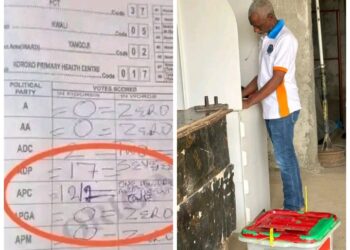Businessman Femi Otedola has commended President Bola Tinubu for breaking with the past by fully deregulating Nigeria’s downstream petroleum sector, describing the move as an unprecedented show of political will that has ended years of rent-seeking, subsidy abuse and product diversion.
In a statement made available to journalists, Otedola said the policy had “broken the grip of entrenched interests and ushered in a new era of transparency, healthy competition, and customer-centric service delivery.”
He stressed that the reforms marked a decisive departure from decades of inefficiency and opened the door to a more accountable energy market.
The billionaire businessman also pointed to the operations of the Dangote Refinery as a major turning point for the country’s quest for energy independence. He congratulated Aliko Dangote for what he described as a bold investment that has begun to transform fuel supply and logistics in Nigeria.
Otedola traced the origins of one of the sector’s major pressure groups, saying, “I founded DAPPMAN in 2002 (23 years ago) with a clear mission, to challenge the dominance of the major marketers and give independent depot owners a fair platform to thrive.” He recalled the early leadership arrangement — the late George Enenmoh as Chairman, Otedola as Vice Chairman and Sayyu Dantata as Secretary, and explained that depot ownership then filled critical supply gaps created by an inefficient system dependent on imports.
He argued that those commercial realities have altered, saying Nigeria now has more than four million metric tonnes of storage capacity, much of it idle, and the Dangote facility is supplying local markets with fuel that was previously imported. “We now have domestic production and local supply efficient, reliable, and proudly Nigerian,” Otedola wrote, and he added that the refinery’s operations have begun to relieve the logjam around Ibafon, Tincan and Apapa.
The former depot owner-turned-commentator said the logistics chain has been upgraded alongside refining capacity. He highlighted the refinery owner’s investment in fleet modernization, noting the acquisition of some 8,000 CNG eco-friendly trucks to distribute product nationwide, which he said will cut pollution and reduce breakdowns compared with older vehicles still used by some operators. “I know this business intimately. I was king of it and at the peak of it in 2005 (20 years ago), I was conferred with the life patron of the PTD union by Mr Akinlaja. So, when I say the game has changed, I speak from deep experience,” he wrote.
Otedola warned that many depot owners remain wedded to a model that depended on imported product and the payment of Petroleum Product Imports (PFIs), a system he said encouraged complacency and arbitrage. With PFI gone, he questioned calls by DAPPMAN for N1.5 trillion in compensation from the Dangote Refinery. “Since PFI is gone, I see no reason why Dangote Refinery should subsidize DAPPMAN with N1.5 trillion which they are asking Dangote Refinery to pay and subsequently pass this cost to consumers,” he said.
Turning to past subsidy practices, Otedola recalled alerting a former president that the subsidy architecture chiefly advantaged depot owners. He claimed that “Over ₦2 trillion was siphoned through questionable claims, all tied to depot licenses,” and argued the policy rewarded rent-seeking rather than openness or fresh investment.
He also challenged a common assertion linking depot scale to job creation. “Depots do not drive employment as some claim. A typical depot employs perhaps five people, gatekeeper included,” he wrote, contrasting that with filling stations, which he said provide work for pump attendants, cashiers, security staff and cleaners. Based on that logic, he urged DAPPMAN members to pivot toward last-mile retail outlets instead of clinging to tanks designed for a fuel-import economy.
Otedola pointed to international experience to buttress his case, observing that depots in hubs such as Amsterdam and Houston were built to support export flows, often into Africa, and became less relevant when importing markets developed local refining. He drew a parallel with the cement sector: once domestic production rose, the bulk carriers that used to call at Nigerian ports were retired or sold as scrap. “The same outcome awaits fuel depots,” he warned.
The businessman urged depot owners to act quickly — sell, restructure or redeploy capital into new value chains or risk insolvency. He suggested a constructive route for those who still believe in market competition: buy and attempt to run an existing refinery, such as Port Harcourt, to see whether private ownership could succeed where the national operator struggled. He praised early exits by industry players who read the market correctly, citing Folawiyo Group’s sale of its depot as an example of foresight.
While scolding those who resist reform, Otedola reserved strong praise for Aliko Dangote. He said the refinery is more than a fuel plant; it is a full logistics investor reshaping the downstream landscape. He compared Dangote’s market impact to global firms that upend incumbents and help create new ecosystems, and he applauded Dangote’s push to localize production and distribution.
On the question of compensation and the future architecture of the downstream sector, Otedola was blunt: the old privileges must end. He urged stakeholders to embrace self-sufficiency, greater openness and sustainable avenues of value creation. “DAPPMAN had its place but today, its relevance is fast fading. We must stop clinging to outdated privileges and focus on a new era built on self-sufficiency, transparency, and sustainable value creation,” he said.
He closed his statement with a personal note to Mr Dangote: “Africans are proud of you. And yes, my dear brother Aliko, you can now go to Monaco and rest jejely like me. You’ve earned it.” The line underlined both the admiration Otedola holds for the refinery boss and the certainty with which he views the shift underway in Nigeria’s fuel industry.
Observers said the intervention will intensify debate between independent depot operators and refinery interests as the country adjusts to local refining and the end of subsidy-era economics. Policymakers and market participants will now face the task of managing a transition that promises lower dependency on imports, fewer opportunities for leakage and a deeper retail network – provided incumbents accept the new commercial landscape and reposition themselves accordingly.





